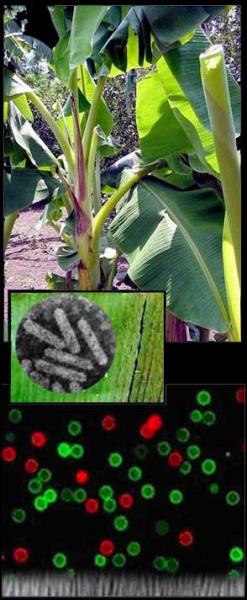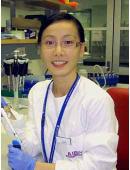CRC60107: Nano Banana - PhD
The major aim of this research is to develop a multiplexed nanosensor assay for known viral pathogens of banana. The project will investigate the potential of a recombinant antibody array to detect virus particles. It is hoped that great efficiencies in virus diagnostics could be achieved if all assays could be done simultaneously using a single diagnostic platform.
What is the biosecurity problem?
Bananas are considered the most important fruit crop in developing countries and are the world's most exported fresh fruit in terms of volume and value. By world standards, Australia is a relatively small producer of bananas, however over 20.4 million thirteen kilogram cartons of bananas with an estimated wholesale value of AU$320,350 million are grown per annum, making it one of the most lucrative of the country's horticultural industries.
Cavendish, the mainstay of the Australian banana industry is susceptible to at least twenty different virus species, including Banana bunchy top virus (BBTV), Abacá bunchy top virus, Banana bract mosaic virus, the Abacá strain of Sugarcane mosaic virus (SCMV), Cucumber mosaic virus (CCMV) and upwards of fifteen different badnaviruses, any of which could devastate the industry if introduced.
Although good diagnostic assays are available for some of the banana viruses such as CMV, BBTV and SCMV detection of the badnaviruses causing banana streak disease is still very problematic. This is due to their great sequence diversity and also the integration of some badnavirus species DNA of in the genome of the banana plant. Standard polymerase chain reaction diagnostics using nucleic acid as a template are incapable of discriminating integrated from episomal (actively replicating) badnavirus DNA and therefore cannot be used for routine virus indexing work as part of clean planting material schemes.
The outputs of this project are to:
- contribute to a better understanding of virus particle structure and the distribution and variability of epitopes, leading to more robust serological techniques
- provide new, cheaper antibody array technologies with better orientation of antibodies on the solid phase and less non-specific binding of proteins
- provide a model system for the use of nanosensors to detect all types of protein markers, not only those associated with plant viruses but also animal viruses and even cancers, and
- train a PhD graduate trained in molecular detection technologies for plant pathogens.
Who will be the end-users of your research?
- Australian Quarantine and Inspection Service
- State and Territory Department of Primary Industries
- Australian banana industry
- Diagnostic laboratories, and
- Nanomics BioSystems Pty Ltd.

Publications for this project
STUDENT
PROJECT DETAILS
Active
Supervisor
Dr Andrew Geering (QDPI&F), Dr Bronwyn Battersby (AIBN- UQ), Dr Hans Heines (CSIRO) and Dr Paul Campell (QDPI&F)
Supervising Institution
University of Queensland
Term
May 2008 – May 2011


